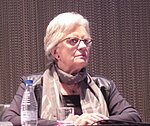Spanish philosopher
Victoria Camps |
|---|
 Victoria Camps in 2016. |
| Born | (1941-02-21) February 21, 1941 (age 83)
|
|---|
| Occupation(s) | Politics, philosopher, writer |
|---|
| Political party | PSC-PSOE |
|---|
| Website | Victoria Camps Cervera |
|---|
Victoria Camps (born 1941, Barcelona) is a Spanish philosopher and professor of ethics.[1]
Career
She obtained a degree in philosophy at the University of Barcelona, completing her thesis, entitled “La dimensión pragmática del lenguaje”, in 1975.
She has been the vice-rector, lecturer and full professor of ethics at the Autonomous University of Barcelona. She has participated in the bioethics committees of the Hospital del mar and of the Hospital de la Vall d’Hebron.
Between 1993 and 1996 she was a senator for the Socialists' Party of Catalonia.
She is currently a member of the Bioethics Committee of Spain and collaborates in journals such as “Isegoría” and “Letra internacional”. As a philosopher, she is deemed[by whom?] a very influential author and one of the main inheritors of the thought of philosophers José Luis Aranguren and José Luis Ferrater Mora.
Her work and ideas cover a vast arrays of topics, from pragmatics to theology, and from the exclusion of women from work to ideals of well-being and citizenship in the modern state, together with ethics in communication and in public representation.
Awards
In 2008 she became the 22nd recipient of the Menéndez Pelayo International Prize.
